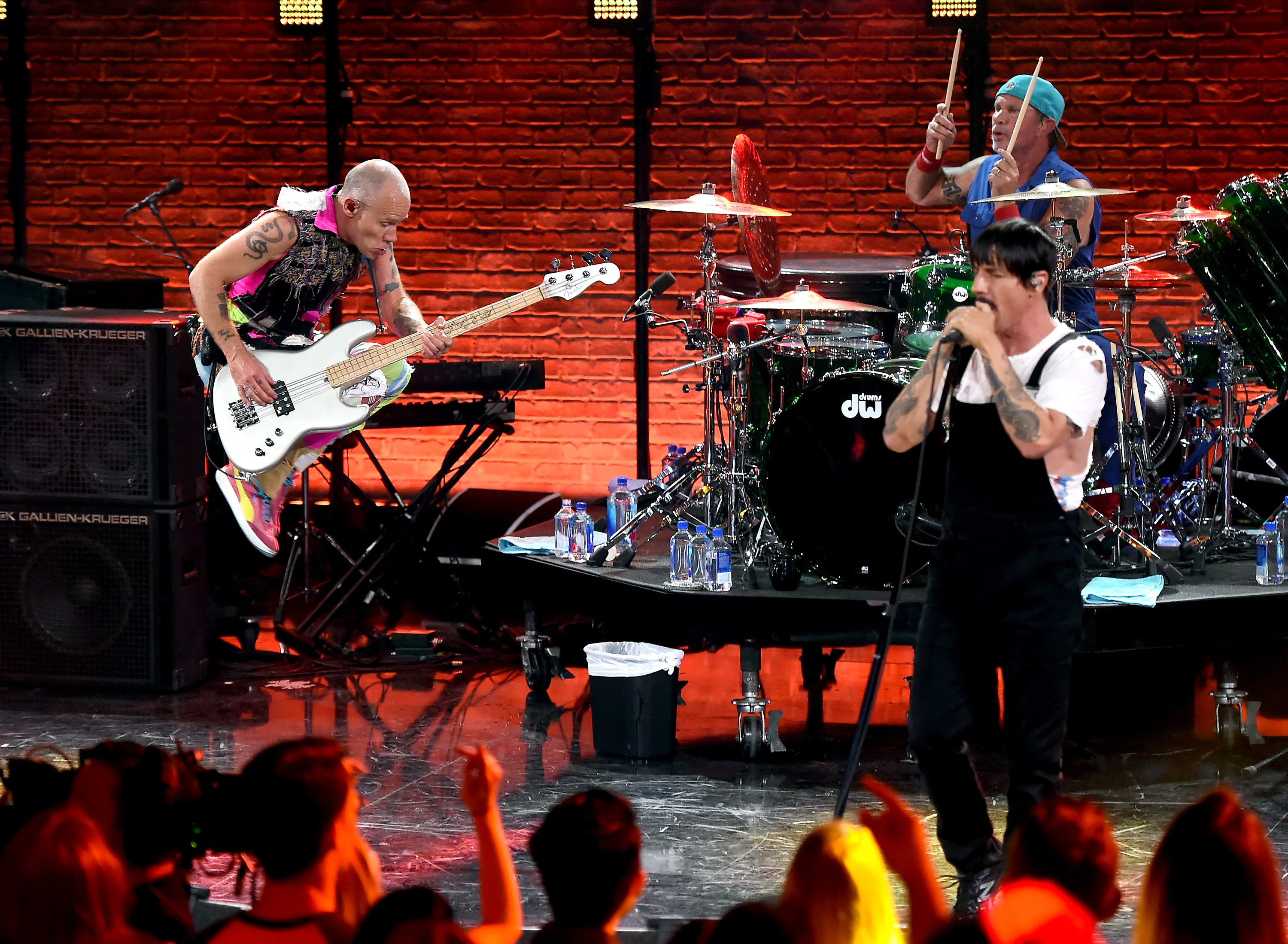Release Date: June 17, 2016
Label: Warner Bros.
Like a Phoenix rising from the ashes of a recently kicked bowl of California’s finest medicinal-grade greenery, the Red Hot Chili Peppers decided that 2016 was a time for rebirth. Thirty-three years, three drummers, seven guitarists, and a whole lot of personal and professional struggles removed from their formation as a precocious group of fun(k)-loving kids in, yes, the City of Angels, they decided to stretch the seams of the winning form and rip it all up on The Getaway, their 11th studio album.
For starters, that meant tossing Rick Rubin, who produced every one of the band’s previous six albums. This is no small behind-the-scenes swap — he sat behind the boards for every album since 1991’s immortal, tumescent BloodSugarSexMagik. Essentially, if you’ve ever encountered the joy buzzers of Flea’s slap bass runs on the radio or in the wild, it was very likely laid to tape by his bearded California brother-in-arms. Instead, they enlisted another producer–to–the–stars — Brian Burton, best known to the public as Danger Mouse — who’s spent the better part of the past two decades turning the most lackadaisical material of legacy rock bands, bluesy upstarts, weirdo rappers, and Pacific Northwest indie-rock darlings into stars.
The Chili Peppers had reportedly been a bit nervous of Burton’s hip-hop-informed way of working — that is to say, helping the band work out material in the studio, layering elements one at a time — but his touch here helps smooth out the rough edges that Rubin would purposefully emphasize. Those slap-bass lines, for example, feel more like a handshake — a less painful surprise. And Kiedis always had this sort of staccato West Coast rap thing going on; why not work in a way that highlights their singer’s strengths rather than try to outrun him? A tip of the bucket hat should also go to Radiohead’s longtime producer and Flea’s Atoms for Peace bandmate, Nigel Godrich, who handles mixing duties on this record and aids in the unexpected restraint that marks much of The Getaway.
Also new is the wholehearted integration of guitarist Josh Klinghoffer, who joined the band during the construction of 2011’s I’m With You, but whose needling style hadn’t yet fully meshed with Flea and Chad Smith’s bulldozing rhythm section. Half a decade on the road together, and Klinghoffer’s familiarity with Burton (as a session player and touring member of the producer’s famed duo, Gnarls Barkley) has brought him fully into the fold here. Here, the band succeeds in making room for some of his more outré effects experimentation on the title-track opener, whereas his contributions often felt like unnecessary excess on some of I’m With You’s simpler moments. On The Getaway, listlessly delayed guitar lines only aid in the record’s easygoing slipperiness. He gives performances fitting of his old pal John Frusciante on the breezy, bluesy bong-belch “Sick Love,” a mid-tempo Hendrixian swayer that happens to feature Elton John on piano. It’s one of the LP’s best moments, and one of just a few that connects this version of the band to their most beloved iterations.
But despite all these changes on the periphery, the one thing that’s stayed relatively static is the person with the ultimate power to make or break a Chili Peppers track: Anthony Kiedis. At his best, he’s been an emotional center, meditating on addiction, love, loss, and the troubled history of his beloved home state without letting the heaviness of his subject matter turn off the masses. At his worst, he’s rapping about his dick and offering up absurdist scats that fans have best been able to transcribe as “ba-di ba-da ba-zumba crunga.“ Here he’s nearly all emotion, and largely succeeds. The “suicide will never save you” kicker of “Goodbye Angels” is one of the most painfully defeated lyrics in a career built on them. And the “small fuss” that he sings about tabloids making when a dead body’s found on a tour bus both feels like a harrowing depiction of some of Kiedis’ peers, and a reminder of an alternate course that his own life could have taken. It’s a gut punch.
Of course, this is lightly undercut by moments like “Go Robot,” the ode to antipathy that finds Kiedis, in an attempt at conjuring pathos out of emotional stuntedness, crooning “robots are my next of kin.” Then there’s the altogether misguided “Detroit,” which clumsily name-drops both the Stooges and J Dilla, but mostly feels like a rebuttal to comedian Jon Daly’s “Abracadabrilifornia” (which parodied the band’s tendency toward L.A. ballads so successfully that many assumed it was an actual Chili Peppers track making the rounds) — as if Kiedis needed to prove he can personify other American cities, too. But you have to write what you know.
Hard reboot or not, you don’t step to a Red Hot Chili Peppers album in the year 2016 not expecting some of those moments. Part of the joy in these records is the occasional inanity of Kiedis’ lyrics — to the point that he even uses their verbose absurdity as a skewering of the Trump-era nonsense of American electoral politics on “We Turn Red.” (On repeat listens, “Give me all your sick and your tired / Races that we admire” scans as both total gibberish and a pointed attack on hypocrisy in the good ol’ U.S. of A.) To that end, The Getaway is about as good as you can hope for from a band who will, without reservation, hang out in a car with late-night-TV cornball James Corden with lavalier mics forcibly affixed to their naked torsos (a bit of movie magic I’d be okay never having properly explained, frankly). They’re unrepentant goofs, who try to write songs about what matters to them, and sometimes they’re great, and sometimes they’re funny, and sometimes they’re both. There’s no changing the essential building blocks of their sound, but this shift accentuates its positives more than anyone could have imagined. Ba-di ba-da ba-zumba crunga, they’re meaningless and all that’s true.





